5 Things to Know about Google’s Software Engineering Internship
Google can be harder to get into than Harvard - let's break down what you should know.

I talked to a couple of former Google software engineering interns to see what the process is really like, from application to return offer, and to ask for any advice for Google intern hopefuls.
But First: Some Facts
Slotted at #1 most prestigious in Vault.com’s 2020 best internship rankings, the Google internship program is one of the most coveted in the world. Although exact acceptance rates are hard to come by, a Google spokesperson estimated it to be somewhere around 3.75%, making the internship program statistically harder to get into than Harvard.
On top of prestige, Glassdoor ranks it as the 4th highest paying internship, with a median monthly salary of $7500 as of 2019. However, the additional housing stipend of $9000 might put it even higher. Google’s headquarters are in Mountain View, CA, putting it in the heart of Silicon Valley, the tech hub of the United States. Although especially well-known for its software engineering program, Google offers a variety of internships, including BOLD (for sales, marketing, and people operations), STEP (formerly known as engineering practicum), an associate product manager program and many others. Still, as a company founded by two computer science grads, Google places a lot of value on its developers. Some employees describe it as an “engineer-driven” company.
Make Your Application Stand Out
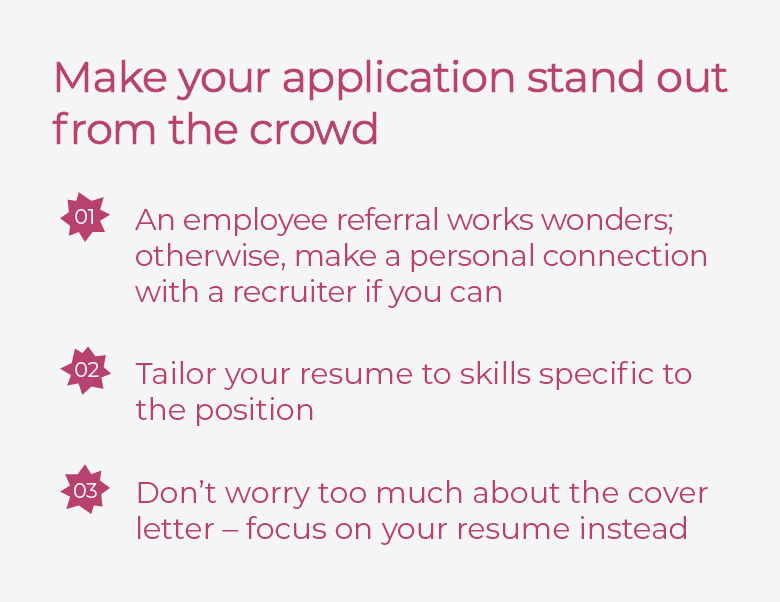
Google internship applications typically open in September of the previous year, so it’s a good idea to start early. Nathan Leung, a University of Michigan student who interned at Google after his freshman year, said that he found the resume filtering process to be the most difficult step to make it past.
If possible, try to get a referral from an employee you know or hand your resume to a recruiter from a job fair or company talk. Making a personal connection will give your application a better chance of making it past the original resume filtering step.
If neither of these avenues are available to you, edit your resume to highlight skills that are most relevant to the position. Use specific numbers and goals to describe previous projects and titles you’ve held. Recruiters only have about six seconds to look over each application, so be concise with your language and choose an easy-to-read format. Google is notorious for tossing cover letters, which means you can channel all of your energy into crafting the most eye-catching resume.
Interview Prep: Start Early!
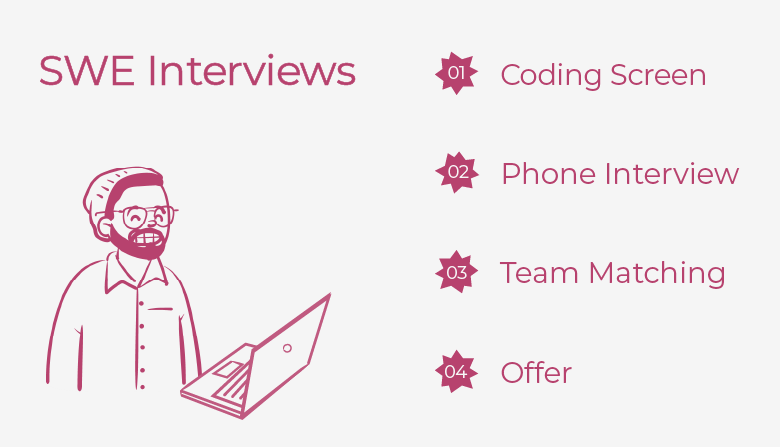
If your resume is selected, you’ll be asked to complete a coding exercise and survey. If you pass those, you’ll move on to schedule a two-part phone interview and complete a questionnaire about your team and location preferences. The questionnaire will be used for matching later on in the process and allows you to indicate your interests.
In each part of the phone interview, you’ll be given 45 minutes to answer a technical question. You can have your choice of programming languages-- Java, Javascript, C, C++, or Python. You’ll need to study up on topics including sorting, big O analysis, data structures, graphs, mathematics, and recursion. Websites like HackerRank and LeetCode have access to free practice questions, as well as a paid premium subscription for even more content. The book “Cracking the Coding Interview” is also a thorough guide to technical interview prep, even advertised by Google itself.
However, according to David*, a former software development intern at Google and current Facebook software engineer, many applicants settle too quickly when preparing for coding challenges.
“When solving a problem, just getting the right solution is never enough,” he says. “You have to be able to explain the reasoning, and you always have to explain other approaches. There’s always more than one way to solve a problem. There’s also sometimes more than one optimal way.”
David advises using LeetCode to look at other people’s answers and compare them to your own. He says this practice will come in handy when the interviewer asks follow-up questions about your response.
👉Try next: Can you cut it at Google? Try answering 100 recent interview questions
Team Matching: The Final Step Before an Offer
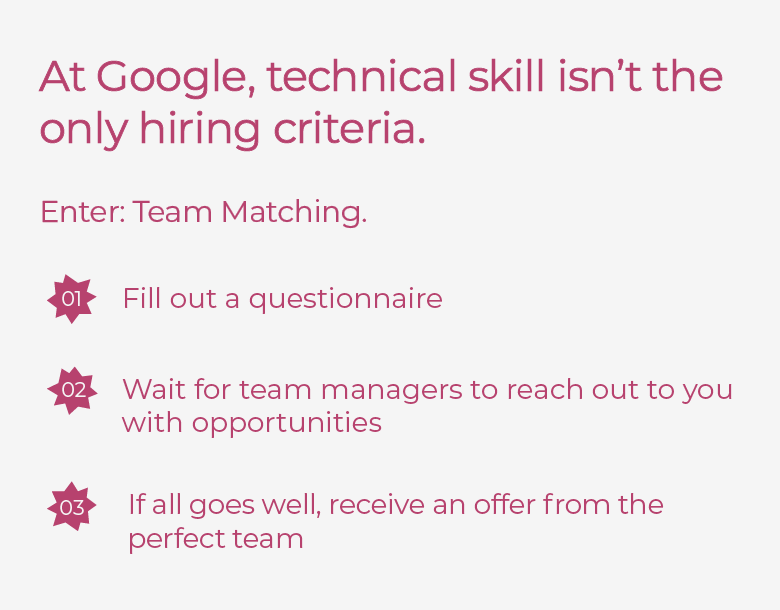
If you pass the phone interviews, your application will go through a matching process based on the questionnaire you filled out earlier. (But if your results were borderline, you may be asked to complete a third challenge before this step.)
At this stage, team managers will look through the pool of applicants who’ve made it this far to decide who they want to take on as an intern. If you’re selected, you’ll set up a follow-up interview with your potential host, and if you’re both still interested, they’ll give you an offer. Unfortunately, because of this requirement, it’s entirely possible to pass the technical interviews and still not end up with an internship.
Some interns try to fill out the matching questionnaire strategically to give them the highest chance of being selected. Leung read a post on the tech forum Blind that managers will sometimes filter out candidates who indicate a desire to work with machine learning but don’t have any prior experience, so he made sure to steer clear of that category. However, it’s still important to list genuine interests, as a lack of enthusiasm during the follow-up call can also dissuade a manager from choosing you.
The Internship: Make the Most of Your Experience
Take advantage of the perks
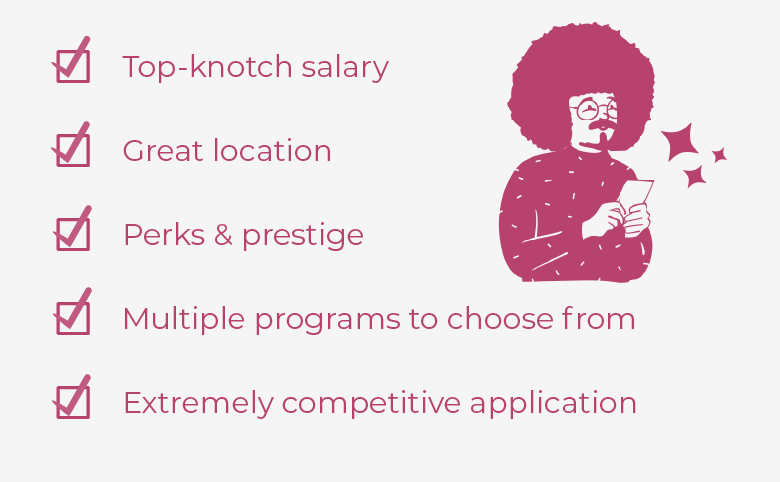
As its reputation suggests, working at Google can be an unparalleled experience. If you end up interning there, don’t let those 12 weeks go by too fast. Although remote work may put a damper on the in-office perks like free food, gyms, and game rooms, Google still has plenty more to offer.
David was amazed at the internal video courses available to Google employees. He remembers one called “Life of a Page” that taught about how Google search really works.
“It was an hour long course, but it felt like ten minutes,” he says.
Although David worked at the smaller Seattle office, he was surprised by the abundance of senior engineers who were willing to put in the time for a junior engineer or intern who asked for it.
But as with any internship, there can also be some drawbacks. Since Google replaced its company housing with a stipend, some interns are in for a long commute. Although many interns work out housing together through a Facebook group, Leung received his offer months after most of his intern class. He ended up getting an Airbnb in San Francisco, which meant an hour and a half commute to and from the office in Mountain View.
Getting a return offer isn't a guarantee
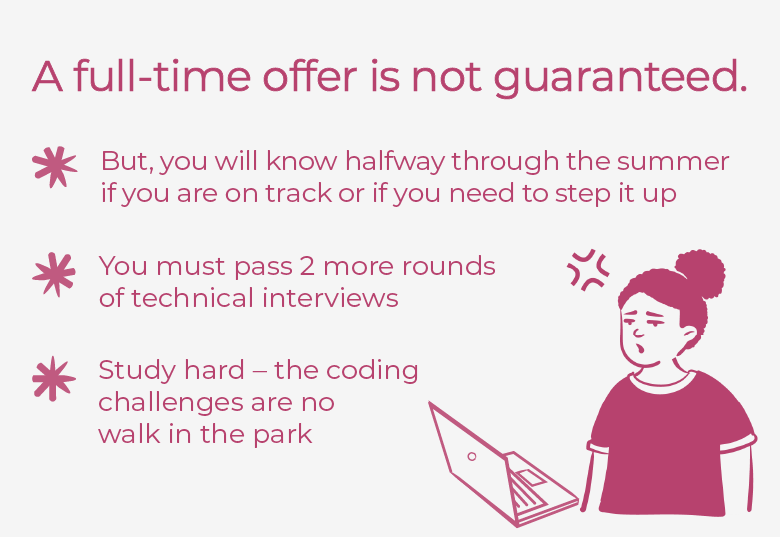
Like many interns, you probably aspire to work at Google full-time at the end of your program. However, the internship isn’t a straight shot into a job at Google. Half-way through the summer, you’ll have a meeting with your manager where they’ll tell you how you’re trending-- toward a return offer or no return offer.
However, your performance only makes up part of the equation. At the end of your internship, you’ll also have to complete two more rounds of technical interviews. If you fail those, you don’t get an offer, no matter how glowing your team’s recommendations are. Because the skills tested in the coding challenges are so distinct from the work you complete during your internship, many interns will start studying for hours after they finish work for the day, starting a few weeks before the program ends.
Fortunately, if you’re just hoping to come back for another summer, you’ll have a much easier time. Leung says that the returning intern process is much more laid-back and solely based on employee recommendations. He received an offer for the following summer without having to go through a single interview.
While Google is made up of incredibly talented employees and has a competitive software engineering internship to match, it’s still an achievable goal if you put in the work. And the hours you put into your resume and interview prep will be worth it. Although David didn’t end up accepting his full-time offer, he still appreciates the experience he gained at Google.
“I think Google is a great place to work,” he says. “It definitely lives up to the dream.”
*Name changed for privacy purposes
The information provided herein is for general informational purposes only and is not intended to provide tax, legal, or investment advice and should not be construed as an offer to sell, a solicitation of an offer to buy, or a recommendation of any security by Candor, its employees and affiliates, or any third-party. Any expressions of opinion or assumptions are for illustrative purposes only and are subject to change without notice. Past performance is not a guarantee of future results and the opinions presented herein should not be viewed as an indicator of future performance. Investing in securities involves risk. Loss of principal is possible.
Third-party data has been obtained from sources we believe to be reliable; however, its accuracy, completeness, or reliability cannot be guaranteed. Candor does not receive compensation to promote or discuss any particular Company; however, Candor, its employees and affiliates, and/or its clients may hold positions in securities of the Companies discussed.
